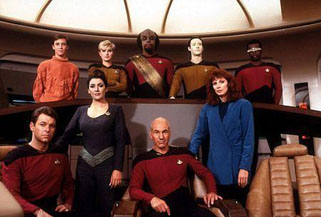Mythology: Star Trek
By Martin Felipe
June 3, 2010
BoxOfficeProphets.com

Now, in the spirit of full disclosure, as a proud fan of most of these mythology-based worlds, one which never really grabbed my imagination is that of Star Trek. Okay, I take that back, I do like the world of Star Trek. I like the concept of an inter-planetary United Nations. And my bleeding heart liberal soul loves the Prime Directive, the concept of exploration of new cultures without butting in and imposing our own world-views upon them. Gene Roddenberry was certainly a man after my own political heart, espousing his own left leaning ideals through his Enterprise crew's adventures.
Of course, like most people, I'm a bit more familiar with Star Trek: The Next Generation, which is so consumed with the ideology of the Prime Directive it eliminates much of the potential for conflict. See, here's the problem, we libs are a peace-loving sort, and that may be all well and good in the real world, but is deadly for drama. When telling stories, conflict is key, and Picard and his buddies are so intent on not interfering, it can get kind of dull. Hell, the very description of the show is to boldly go where no man/one has gone before. That's it. To look around. Sounds cool at first, but when you consider what that means, as audience members, we are watching people watch. We are voyeurs of the voyeurs.
Now I know I've been a big proponent of strong characters overcoming weaknesses in the story or formula, and Star Trek is no different. If you can't create tension from without, create it from within. I do think the characters are incredibly well drawn in Trek, if of varying levels of quality acting-wise. We all know the big names, and they are rife with potential for conflict. Dashing, impulsive Kirk, crotchety old McCoy, jovial Scotty, steadfast, cerebral Picard, loyal Ryker, and so on. The characters are so well-drawn, we can derive pleasure from watching them behave exactly as we expect and predict them to. Some characters are even defined by their internal conflict, as in the case of Spock grappling with his emotions or Data's dreams of becoming a real boy. Including Worf, a Klingon, the villains of Kirk's Enterprise, as part of The Next Generation crew is a particular inspiration. Problem is, Trek is so mired in the reset button nonsense of traditional television storytelling that the dynamics rarely change, and the characters rarely evolve, so the conflicts become stagnant.
This is part of the reason that the Borg-assimilating-Picard arc was so popular with fans. Though quickly resolved, the ramifications on the character remain resonant for the rest of the show's run and on into the films. There is no "back to normal" cop-out ending for Jean-Luc.
Again, I'm not the expert on Trek that I am with other shows, so I may get some of the details wrong, but as The Next Generation nears the end of its run, the creators start amping up an external conflict, one without any possibility for quick resolution. This conflict is the one between the Romulans and the Cardassians, a conflict which carries over into the next series Deep Space Nine, which I've barely watched at all - which is ironic, because, by all reports, this was a Star Trek with teeth, one which evolves, one which plays for keeps. This may be true - I don't know. I plan on taking a look some day, but by this time, I had gotten so bored with the redundant trope of bringing each episode back to square one, I really had little interest in continuing with the franchise.
Neither did the fans, apparently. Though Deep Space Nine was a big hit, the next show Voyager started strong, then faded and faded and faded. It's a show that seems to have the potential to really open up the Star Trek world, yet fails to on almost every level. The Voyager gets lost in the unexplored Delta Quadrant, outside of Federation territory. You'd think this would provide the opportunity for writers to go for broke and let their creativity fly, but no. Many of the stories seemed like repeats of stories from the Kirk/Picard days, only featuring aliens with even stranger foreheads. In addition, the need to keep Voyager lost in space only drew more attention to the weekly reset. How are we going to avoid saving our crew this time? In addition, the brilliant move of trapping the rebel Maquis with Federation loyalists seemed rife with potential for inter-crew conflict. Then the Maquis started getting along with the rest of the crew. What a waste.
Well, luckily, mythology show genius JJ Abrams got his hands on the franchise and rebooted the whole thing with the current hit movie. Despite my qualms about him altering Star Trek history with the time travel conceit, I can't argue that this is one entertaining film. The exemplary box office and reviews bear this out. And I guess since Abrams does change the past with time travel, this time the Enterprise really is going where no one has gone before. I just hope that this go-round, Abrams is a little more bold.